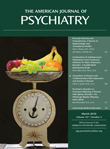To the Editor: On April 6, 2009, at 3:32 a.m., an earthquake (Richter Magnitude Scale number: 6.3) struck L'Aquila, Italy, a town with a population of 72,000 residents. The L'Aquila earthquake caused the deaths of 309 people, with more than 1,000 individuals injured and 66,000 displaced. This disaster provided a unique opportunity to explore the effects of severe stress.
In the present analysis, we report the clinical evaluation of individuals examined from the third to eighth week after the earthquake (N=87; mean age: 50.37 years [SD=14.94]). Sixty-five individuals had already been engaged in a mental health program with follow-up care, and 22 were cases of new-onset illness. None had personal or familial physical injury during the disaster. All diagnoses were based on ICD-10 criteria following an interview conducted by a senior psychiatrist.
All subjects were evaluated using a visual analogue scale, with three anchor points ("better," "equal," "worse") in response to the following question: "How did you mentally feel after the earthquake?" The Clinical Global Impression (CGI), with severity of illness and global improvement (change in score from the last clinical visit prior to the earthquake), was also used to evaluate those individuals already engaged in care.
Among those who had been previously engaged in a mental health program, 25% of persons with schizophrenia (N=7/28) and 26% of individuals with affective disorders (N=5/19) reported a "worse" outcome after the disaster. The remaining patients reported "equal" (schizophrenia: N=16/28 [57.1%]; affective disorders: N=11/19 [57.9%]) or "better" (schizophrenia: N=5/28 [17.9%]; affective disorders: N=3/19 [15.8%]) outcome. Subjects with mental retardation (N=6) all reported an "equal" outcome. Individuals with anxiety disorders (N=7/12 [58.3%]) reported "worse" or "equal" (N=5/12 [41.7%]) outcome (χ2=13.76, df= 6, p=0.03). CGI score comparison among individuals with schizophrenia, affective disorders, and anxiety disorders showed higher severity of illness for schizophrenia (Kruskal-Wallis χ2=14.49, df=2, p=0.001), with no difference in global improvement.
Among patients with new-onset illness, one had a psychotic disorder, 18 had mood or anxiety disorders, and three had behavioral problems associated with mental retardation. Among all new-onset cases, 72.7% (N=16/22) reported a "worse" outcome and 27.3% (N=6/22) reported an "equal" outcome, with no association among diagnoses (χ2=6.7, df=1, 6). Of these first-referral cases, nine experienced posttraumatic stress disorder (ICD 10: F 43.1), and all reported feeling "worse" following the earthquake.
In summary, from a short-term perspective, we observed that persons with schizophrenia and mood disorders showed a better subjective outcome, while patients with anxiety disorders fared more poorly. However, CGI scores did not differ across diagnoses in global improvement.
Katz et al. (
1) reported that patients with schizophrenia remain clinically stable or even improve after disasters, although the opposite has also been shown (e.g., reference
2). Within the vulnerability stress coping model, the subjective perception of distressing situations in the groups examined seems to have not been rapidly translated into a negative appraisal. Symptom-related (i.e., negative symptoms, lack of insight, or drug treatment) and staff-related variables (i.e., a community care model more oriented toward psychoses) could have played a role in counterbalancing the negative effect of the event. In contrast to schizophrenia, the psychobiological mechanisms of vulnerability in anxiety disorders may be more prone to decompensation after stress.
Acknowledgments
The authors thank Drs. Anna Maria Allegro and Stefano de Cataldo for clinical assistance.

